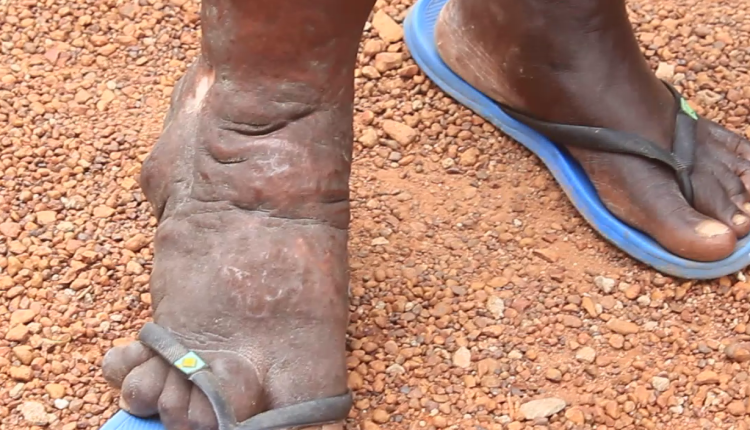Neglected Tropical Diseases (NTDs) continue to receive little or no attention in Ghana, despite their devastating effects on health and livelihoods. Experts warn that the country cannot make meaningful progress without addressing these diseases, which trap many citizens in poverty by preventing them from engaging in productive economic activities.
NTDs are a diverse group of 21 conditions globally, with 14 found in Ghana. These include Lymphatic Filariasis (commonly known as elephantiasis), Onchocerciasis (river blindness), Schistosomiasis (bilharzia), Soil-Transmitted Helminths, Trachoma, Buruli Ulcer, Dracunculiasis, Leprosy, and Rabies, among others. Although these diseases can cause severe pain and disability, they are both preventable and treatable.
Globally, NTDs affect about 1.5 billion people, with Africa accounting for nearly 40% of the global burden. According to the World Health Organization (WHO), about 600 million Africans are affected, and up to 90% of these infections are caused by the 14 NTDs found in Ghana.
One of the most visible NTDs is elephantiasis, characterized by extreme swelling of the legs, which many communities liken to an elephant’s limb. According to the Ghana Health Service (GHS), NTDs are endemic in every district of Ghana, with each district recording at least two types of the diseases. Nationally, there are about 5,000 cases, with over 2,000 found in the five regions of the north.
The GHS reports that out of 116 endemic districts, 109 have met the criteria to stop Mass Drug Administration (MDA). Nonetheless, NTDs continue to keep children out of school and parents out of work, fueling poverty and deepening social stigma.
The NTDs Desk Officer at GHS explained that these diseases are often described as “diseases of the poor” due to their strong association with low-risk perception and limited public attention. He noted that unlike high-profile diseases such as COVID-19, NTDs attract little global funding or advocacy.
Mr. Bright Alomatu, the Desk Officer for Lymphatic Filariasis, emphasized that NTDs are “almost absent from the global health agenda” and remain largely ignored by international funding agencies. He expressed concern about the limited professional opportunities for people affected by NTDs, as well as the intense stigma and social exclusion they face.
Northern Regional Director of the Ghana health service Dr Abukari Abdulai said the condition call for more advocacy and collaboration to ensure that transmission is limited and also manage people with the condition already.

The Northern Regional Director of Health, Dr. Abukari Abdulai, called for increased advocacy and collaboration to curb transmission and provide adequate care for those already affected. Similarly, Northern Regional NTDs Coordinator, Mr. Issahaku Adam, urged the public not to stigmatize patients, revealing that some have even contemplated or committed suicide due to discrimination. He encouraged communities to show love and compassion to affected individuals.
The Northern Regional Director of the National Health Insurance Authority (NHIA), Mr. Alhassan Abdulai Nambili, also called for NTD patients to be enrolled under the NHIS as indigents, allowing them access to free healthcare without the need to renew their cards annually. He explained that the NHIA currently relies on the Department of Social Welfare and other local stakeholders to identify poor and vulnerable persons for inclusion.
Some NTD patients, including Adam Yahaya and Adamu Alhassan from the Kumbungu District and Savelugu Municipality, expressed deep frustration over stigma and isolation. They said that people often avoid them out of fear that the diseases are contagious. “When the pain comes, people stay away as if it’s a transmitted disease,” Mr. Yahaya lamented, adding that his expired NHIS card prevents him from seeking regular care.

The signs and symptoms of acute attack, the two patients explained starts with reddish with fever and uncontrollable excruciating pain. Mr Adam Yahaya who said his NHIS card expired explained that for him not to be discriminated among his peers, he has decided not to eat with his friends anymore.
Myths and Misconceptions
Many Ghanaians wrongly believe that elephantiasis is hereditary or caused by stepping on elephant footprints or feces. In reality, it is caused by parasitic nematodes transmitted through the bites of infected mosquitoes. It is not hereditary, not sexually transmitted, and cannot spread through casual contact. Most people acquire the infection in childhood but only develop visible symptoms in adulthood. Patients who no longer carry the parasite cannot spread the disease, though many asymptomatic individuals can unknowingly transmit it.
Facts about LF
Infection is only through the mosquito, Infection is not hereditary, not transmitted through sex, not transmitted through contact. Most patients acquire the infection during childhood but didn’t show any sign until adulthood.
Most patients who do not longer have the parasites but are only living with the damage caused by the infection cannot spread the disease with others. Many individuals carrying the parasites are asymptomatic and don’t show any sign of the disease but can spread it.
Recommendations
Health experts are calling for stronger advocacy, increased funding, and psychological support for patients. Those experiencing acute symptoms should receive antibiotic treatment (covering staphylococcal and streptococcal infections), analgesics, anti-inflammatory drugs, and antipyretics. Supportive measures such as rest, elevation, hydration, cooling the affected area, and good hygiene are also essential during acute attacks.
Finally, survivors of NTDs who have undergone successful surgeries, especially for penoscrotal lymphoedema and related reconstructive procedures, should be made advocates and public ambassadors. Their stories can help dispel myths and encourage others living in silence to seek treatment without fear of losing their dignity or facing stigma.
This can disabuse the minds of many who are still hiding their conditions in towns and villages for fear of losing their manhood and the stigma.


